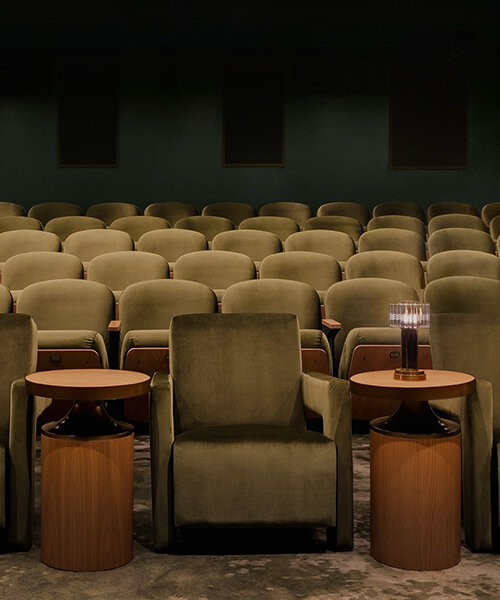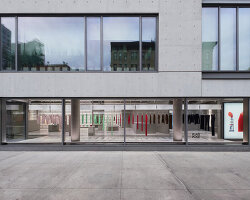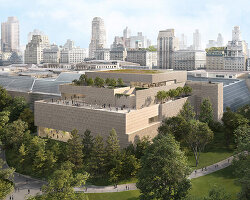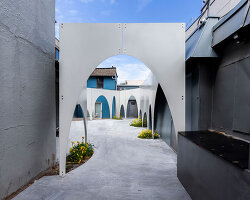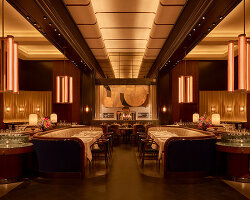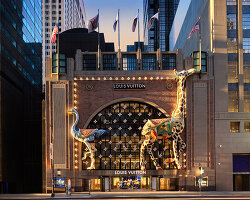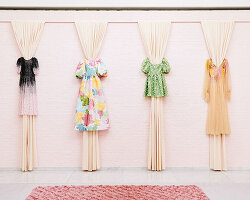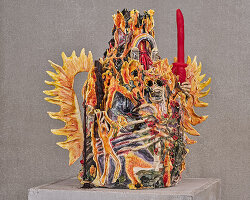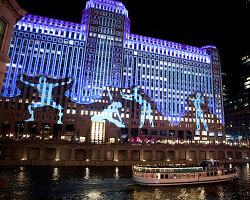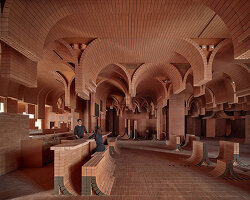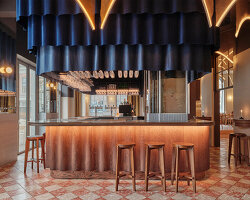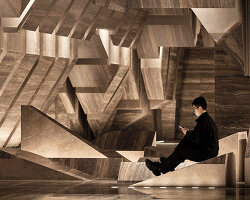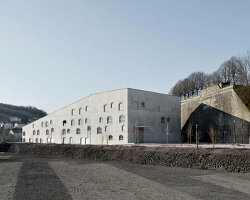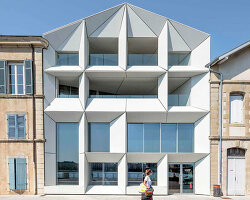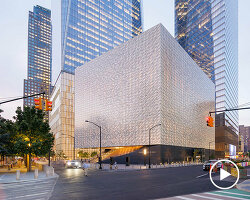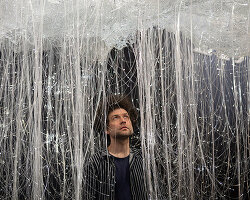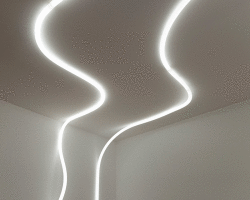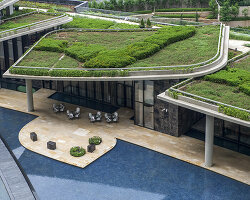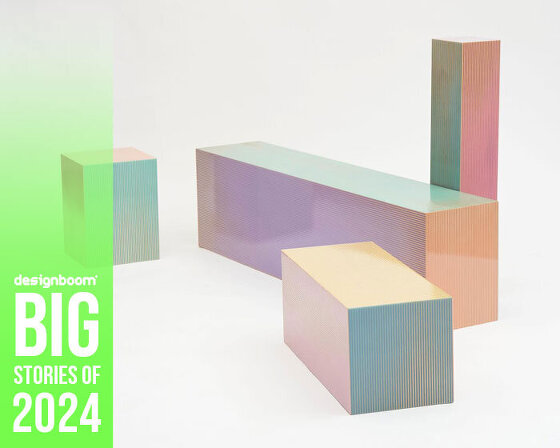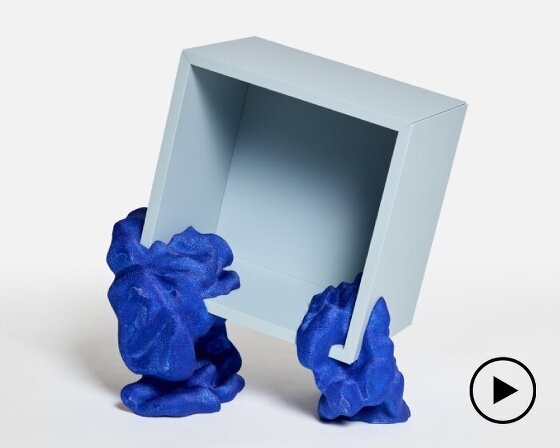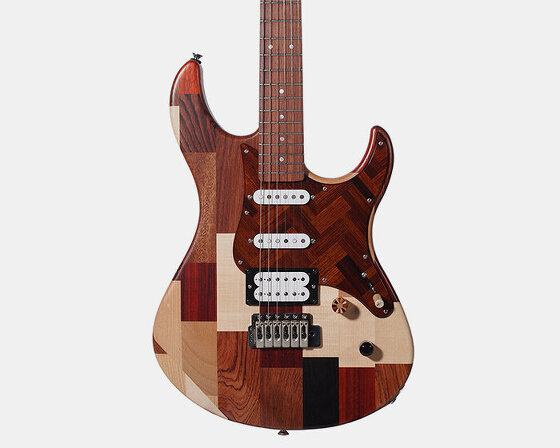creative forces converge in new york
The Cinema by NeueHouse, David Rockwell’s reimagining of the cinematic experience, and the 2024 BlackStar Film Festival have converged in a powerful collaboration. The state-of-the-art cinema has been introduced by Rockwell Group as an addition to its design-minded co-working space in New York City, blending contemporary style with the vintage opulence of 1960s Italian movie houses. Earlier this month, the space hosted an exclusive preview screening and panel discussion for BlackStar‘s annual film festival, which will celebrate its 13th year showcasing Black, Brown, and Indigenous filmmaking this coming August. The event joined innovation, inclusivity, and cinematic artistry to redefine the New York film scene.
designboom attended the screening to take a first-look at this year’s edition of BlackStar Film Festival, and to experience Rockwell Group’s immersive new interiors for The Cinema by NeueHouse. Following the preview and panel discussion, insights were captured from Maori Karmael Holmes, founder of BlackStar, and NeueHouse’s General Manager, Sarita Tabarez.
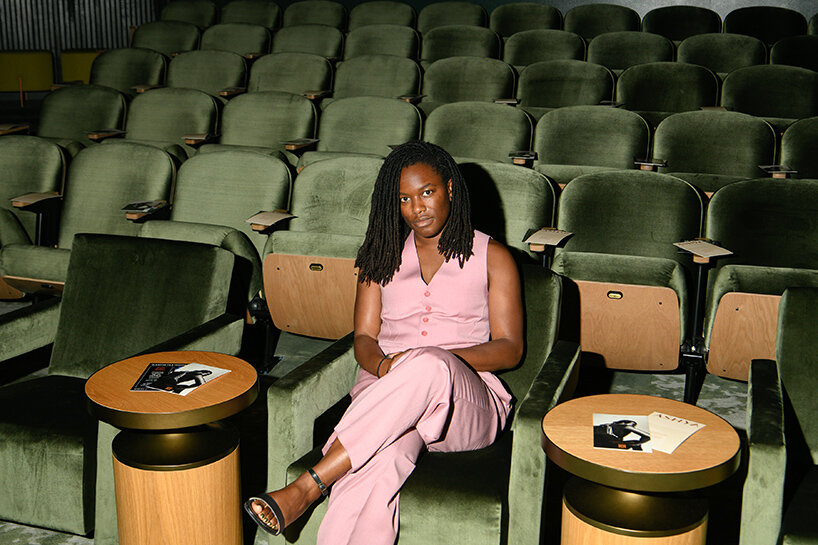
Shatara Michelle Ford at The Cinema. image © Deonté Lee / BFA | header © Jason Varney for Rockwell Group
a first look at blackstar film festival
On July 11th, 2024, The Cinema by NeueHouse hosted its exclusive preview of the BlackStar Film Festival 2024, the premier event celebrating visionary Black, Brown and Indigenous filmmakers. This year’s festival will take place from August 1st — 4th in Philadelphia. During the screening in New York, BSFF showcased visuals from two anticipated films: Dreams in Nightmares by director and writer Shatara Michelle Ford and The Ballad of Suzanne Césaire by visual artist and filmmaker Madeleine Hunt-Ehrlich — between which, BlackStar Projects founder Maori Karmael Holmes was joined by the filmmakers in a panel to speak about their intentions, processes, and challenges.
Through BlackStar Film Festival, Holmes champions marginalized voices and nurtures a platform for their storytelling. Set to take place at Philadelphia’s Kimmel Center for the Performing Arts, the festival will unfold with a varied grouping of cinematic narratives — from experimental works to documentaries — all inviting audiences to learn from the perspectives of Black, Brown, and Indigenous cultures.
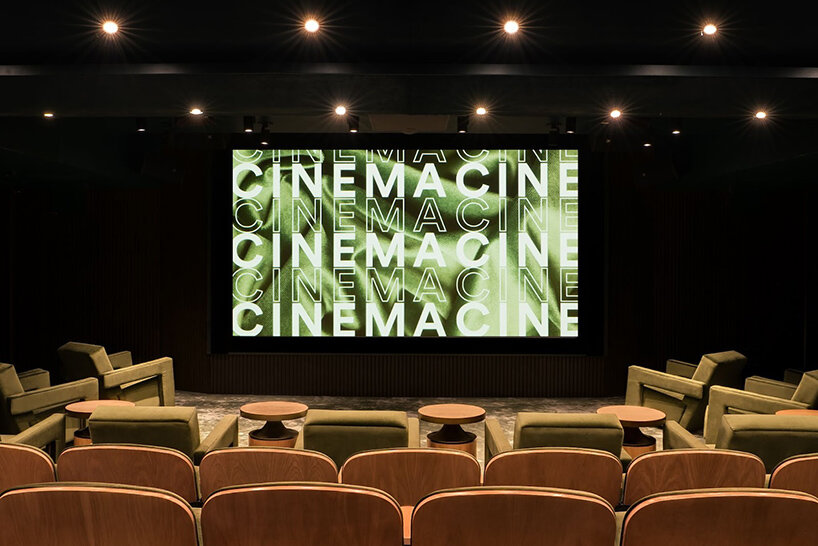
The Cinema by NeueHouse blends contemporary design with the opulence of 1960s Italian movie houses. image © Jason Varney for Rockwell Group
excerpts from the filmmakers’ panel discussion
At The Cinema by NeueHouse, panelists discussed the tension between creative freedom, authentic representation, and industry expectations, especially when experienced through the lens of marginalized voices. They emphasized the need for resources and support for such marginalized communities, and further challenged traditional filmmaking structures to create space for a more inclusive and authentic film. Personal experiences were shared, along with perspectives on the importance of representation, diversity, and authenticity in the film industry.
Shatara Michelle Ford details key moments in their career as a director, uncovering insights into their identity, ancestry, and the systems that govern our society. They explain, ‘During COVID I was feeling a lot of tightness and angst. I was processing a lot of what we were all collectively working on as a society. I was processing the call for community care, and reevaluating how we consider ‘family.’ I saw society retreat into deeper, more entrenched settlements as resources became more scarce and people became more fearful.
‘As an artist, the content of my work is always in conversation with systems that I find problematic. In 2018 I shot a film called Test Pattern, with this tightness and angst in my body. I found that that film was very intense and aggressive. It was calling out these systems, saying: ‘Look! Can you see it?’ At the time, I believed that maybe people just don’t see it. And if they see it, then it will change. I got my heart trampled on when I realized they do see it, but they genuinely don’t care. Or they just don’t have the ability to do anything differently.’
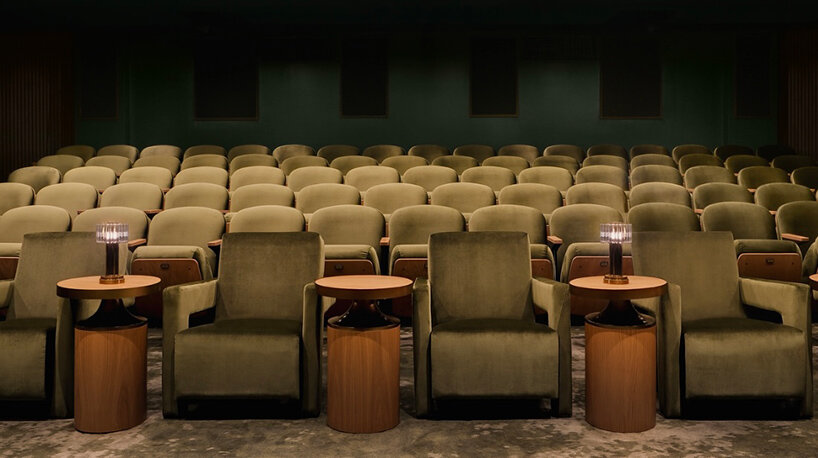
the venue hosted an exclusive preview screening and panel discussion for the 2024 BlackStar Film Festival. image © Jason Varney for Rockwell Group
Ford continues, ‘That led to a lot of frustration because I didn’t know what my job was. I spent more time reframing, healing. I consider myself an indigenous African American, meaning that both sides of my family had been enslaved and displaced. Most of my family stayed put in the Mississippi Delta forever, sitting with all of the pain and complexity. As I connected more with my people, I realized that one of the reasons why I’m here is those who came before me. We have the opportunity for dreaming. We can dream of what is possible. So I tapped into that.
‘Late stage capitalism is keeping us too busy, or too tired. I have a privilege to do this work, and so let me do some healing for everybody. As an artist, I have a lot to say about America, and about being indigenous to this place. I don’t know how to reconcile that I am of this earth, and that this earth doesn’t want me — I should reframe: Earth does want me. The people who possess it are trying to keep it from me. I wanted to make a road trip movie because I wanted to talk about America.’
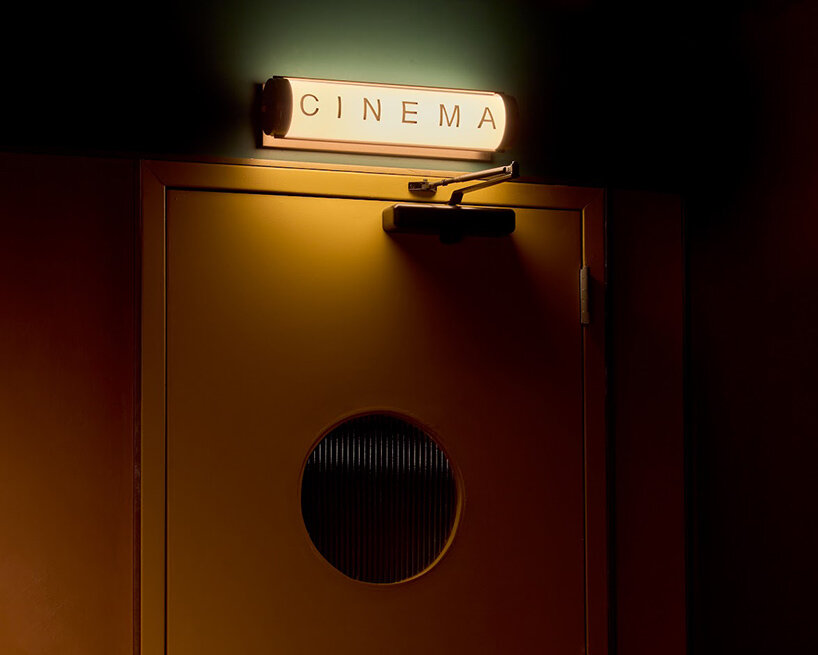
Rockwell Group curates sage green textiles, warm rust and orange tones, and soft ambient lighting. image © Jason Varney for Rockwell Group
Inside The Cinema by NeueHouse
The Cinema by NeueHouse is a continuation of Rockwell Group‘s vision for the contemporary shared workspace in New York. It is curated with inspiration from mid-century opulence as lead designer David Rockwell infuses whimsical details into every corner. The cinema is designed with luxe, sage green textiles, while the lounge shows warm rust and orange tones. Brass, wood, and channel glass details are illuminated by the glow of soft ambient lighting. While the workspace above opens out with lofty ceilings, natural light, and expressive industrial elements, The Cinema is located below ground-level — this way, the design team is able to curate a more private, intimate atmosphere.
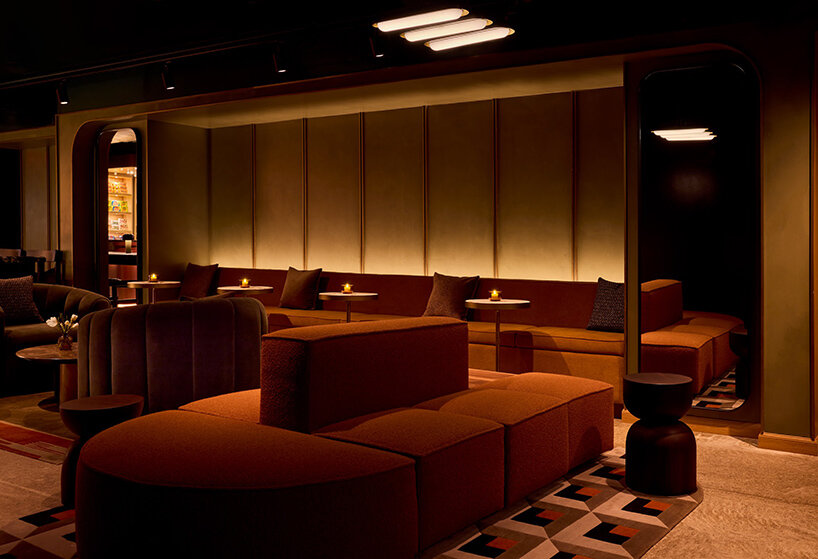
The Cinema includes top-of-the-line projectors and speakers, and a podcast studio. image © Jason Varney for Rockwell Group
blackstar founder Maori Karmael Holmes
DB: The film industry often lacks representation for marginalized communities. How does BlackStar aim to address this gap, and what impact do you hope the festival will have on the broader industry?
Maori Karmael Holmes (MKH): The mainstream film industry often relies on stereotypical representations which contribute to the marginalization of people and their communities. BlackStar has always been focused on connecting independent filmmakers who represent the global majority with audiences who might not always know about their work. Many Black, Brown, and Indigenous filmmakers, especially ones making work that addresses social justice issues or work that is formally challenging, don’t often find opportunities in the mainstream. It’s our hope that the festival is able to nip at the heels of the broader industry and serve as a vanguard, while introducing new voices.
DB: Can you share some of the challenges you faced in establishing and growing BlackStar, and how you overcame them?
MKH: It goes without saying that funding is often a challenge. That has been true since our very first festival. Each year we essentially raise the funds from scratch, finding new or returning partners who invest in our work. While we sometimes have industry partners, our more long-term supporters have been other non-profit organizations and of course our audiences who return year after year.
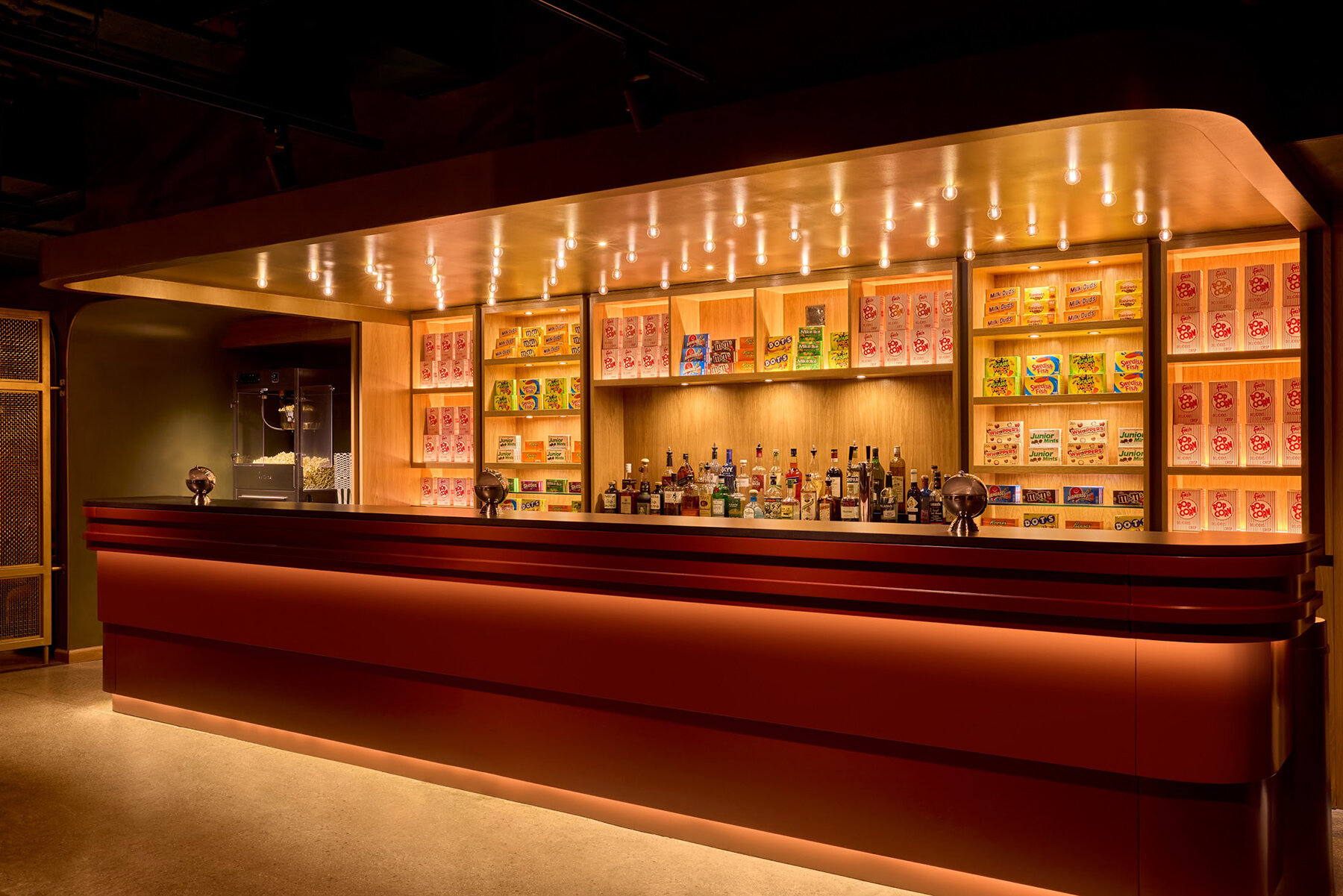
the space has hosted pre-screenings, premieres, and panel discussions. image © Jason Varney for Rockwell Group
DB: What criteria do you use to select films for BlackStar, and what types of stories and voices are you most passionate about bringing to the forefront?
MKH: Our films are reviewed by a global committee made up of artists, curators and programmers. Our Festival Director, Nehad Khader, makes the final decisions in consultation with our committee chairs. We have a working document, a rubric of sorts, that addresses the ideal components of a film that is emblematic of the kind of work that we want to platform, and we refer back to that document throughout the process. A few examples of these types of stories are works that are: centered on the perspectives of Black, Brown and Indigenous communities, genre-defying, aesthetically rigorous, avoid reproducing systemic violence, reflect intersectional feminist thinking, and aim to advance our collective liberation, globally.
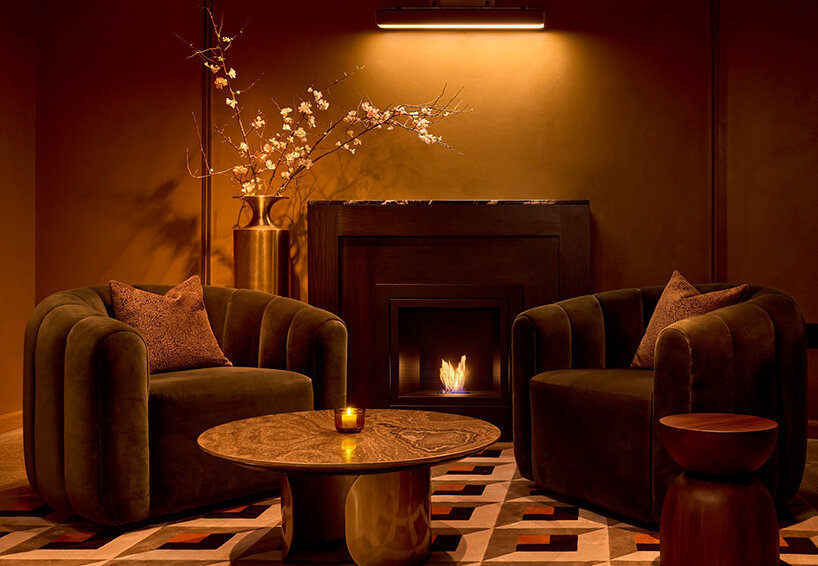
the Cinema’s mid-century aesthetic integrates with modern requirements. image © Jason Varney for Rockwell Group
neuehouse general manager sarita tabarez
DB: The Cinema by NeueHouse is a major addition to your multimedia amenities. How do you imagine it enhancing the creative and professional experience for your members?
Sarita Tabarez (ST): The Cinema by NeueHouse, along with the new podcast studio, are unique amenities that will offer our members opportunities to create and showcase their work professionally. NeueHouse’s core membership base is in the entertainment industry so these are especially designed for those members. Our cinema is Dolby-certified with top-of-the-line projectors, video cameras, recording equipment, immersive speakers, and more. It’s a place where producers, directors, cinematographers, film artists, and documentarists can screen their work.
The podcast studio also has staff ready to record and edit members’ long-standing podcasts or blossoming ideas to start their own. Our members are creative geniuses and true storytellers so we are excited to give them the facilities to share and create their work. These are top-of-the-line amenities that no other social members home offers.
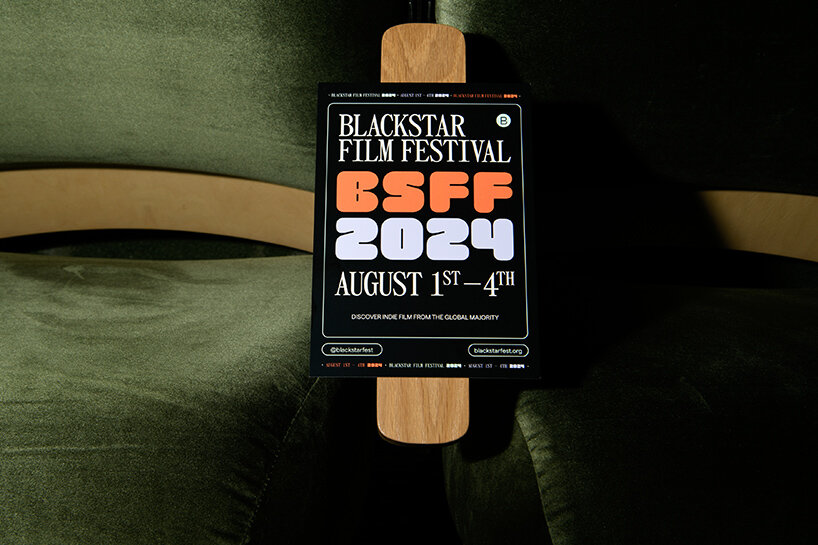
this year’s festival will take place from August 1st — 4th in Philadelphia. image © Deonté Lee / BFA
DB: Because of its luxury design and advanced technical equipment, the space seems ideal for hosting events. What types of events are you most excited to see taking place in this new space?
ST: I’m most excited for our exclusive movie premieres before films hit public theaters. We have already hosted a few, Amy Schumer’s prescreening for Keith Robinson’s new Netflix special, Different Strokes, was a huge success. Chris Rock and Eddie Murphy were in attendance as well. The Cinema also hosted premiere screenings of Back to Black by Sam Taylor-Johnson and Hard Miles by Mathew Modine.
I’m also excited to see how the Cinema is used for other events besides screenings. It could be used for up fronts, press junkets, documentary screenings, and much more. Its a very dynamic space that will continue to grow NeueHouse as the cultural hub for New York City’s emerging and established artistic community. Our programming is forever feeding our member’s curiosity for learning. We are not only a place to work but a breeding ground for our members to collaborate and be inspired by each other.
Although unusual, the cinema is also perfect for lengthy business conferences. With our velvet cushioned seats, it is a comfortable and intimate setting that lends itself to hosting groups of 90 or less for luxurious presentations of all kinds. We can provide breakfast, lunch, and all-day liquid breaks from our gallery restaurant and fresh juice bar to make the best conferences possible.
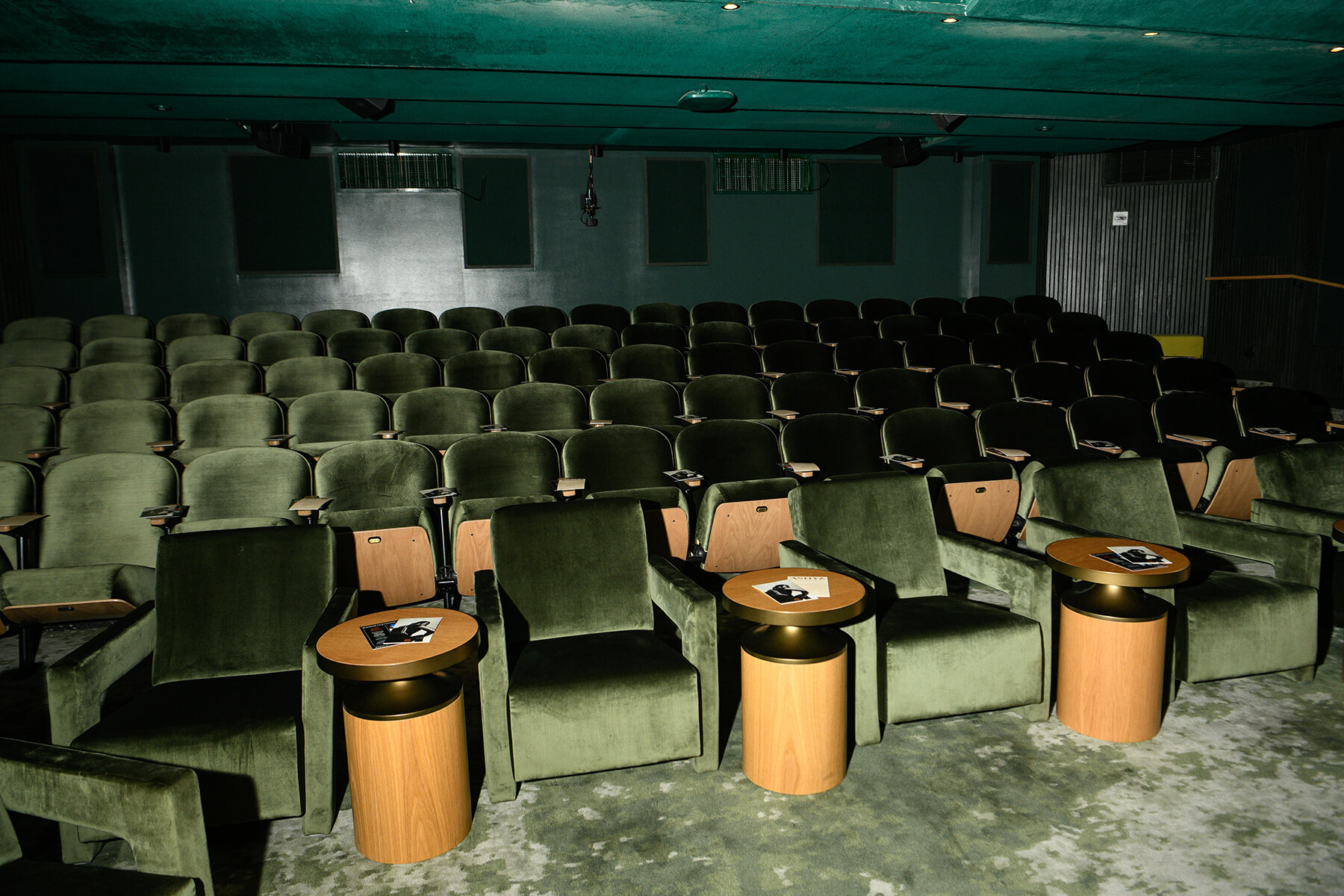
BSFF amplifies marginalized voices, offering a platform for independent filmmakers. image © Deonté Lee / BFA
DB: Can you tell us more about the decision to include a separate cocktail lounge and full-service bar within The Cinema by NeueHouse? How do you think these features will elevate the overall experience for members and guests?
ST: We decided to include these spaces to provide guests with an elevated yet traditional movie-going experience. The bar and lounge are dedicated areas on the same floor as the cinema that allow guests to easily access concessions and drinks. The lounge also provides a private area to socialize before and after a screening, separated from the rest of the house, where other events often occur simultaneously.
The privacy of the cocktail lounge acts as a warm greeting on the way into the cinema, the perfect reception area before the show begins. Here guests can prepare for the screening by getting artisanal candies and popcorn, building the excitement of getting into the theater. Once inside, guests take their seats and cozy in to be immersed in the film, taken on a journey through the silver screen.
As the lights come up, guests can stick around the cinema for intellectual, thought-provoking conversations about the film. We often have Q&As with directors or actors from the feature that shed light on their inspirations and what takes place behind the scenes. On the way out, guests come through the lounge again, where they can enjoy craft cocktails from the bar, eat hors d’oeuvres, and socialize. All of this comes together in a perfectly tailored movie-going experience that makes you want to come back for more.
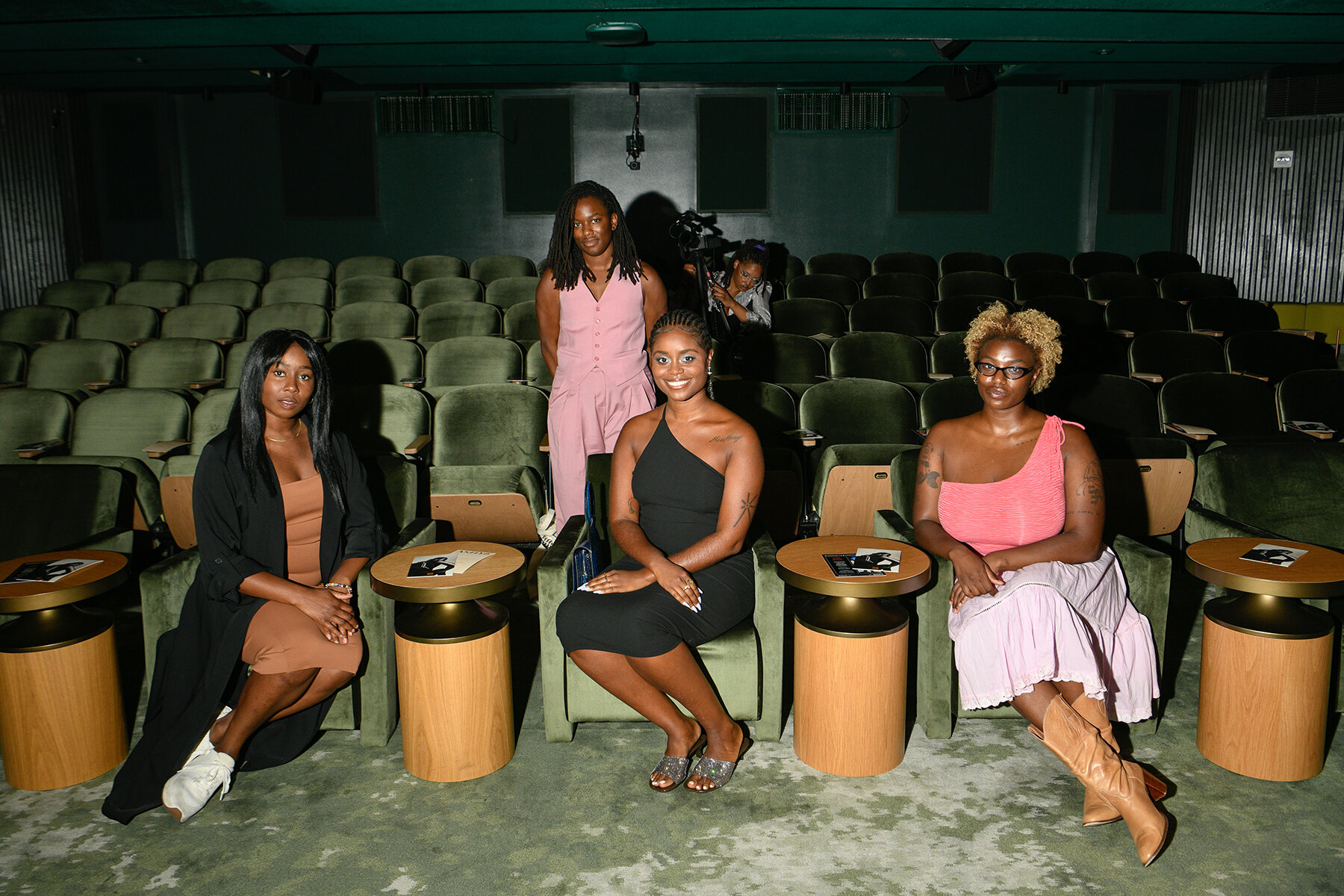
panelists highlighted the tension between creative freedom and industry expectations. image © Deonté Lee / BFA
DB: The integration of a 60s Italian movie house aesthetic is very distinctive. How did you and the design team work together to ensure these elements harmonized with the modern needs of the space?
ST: We wholeheartedly trusted David Rockwell’s vision of the cinema. He was the original architect for NeueHouse and created the luxury spaces NeueHouse members have grown to love for ten years. As a long-time creative partner at the house, and a legendary architect in his own right, he is an expert at harmonizing the utility and aesthetic of any space. It was incredible to bring him back again and an honor to collaborate with him on this magical space.
Personally, my favorite part of the cinema is the color palette and mix of finishes from high gloss to venetian plaster on the walls. The lounge has warm rust and orange tones, which make the cinema pop with it’s sage green walls and seats. Of my favorite features is the fire place in lounge, it gives such a homey feel, along with the vignettes of different seating arrangements for intimate conversations.
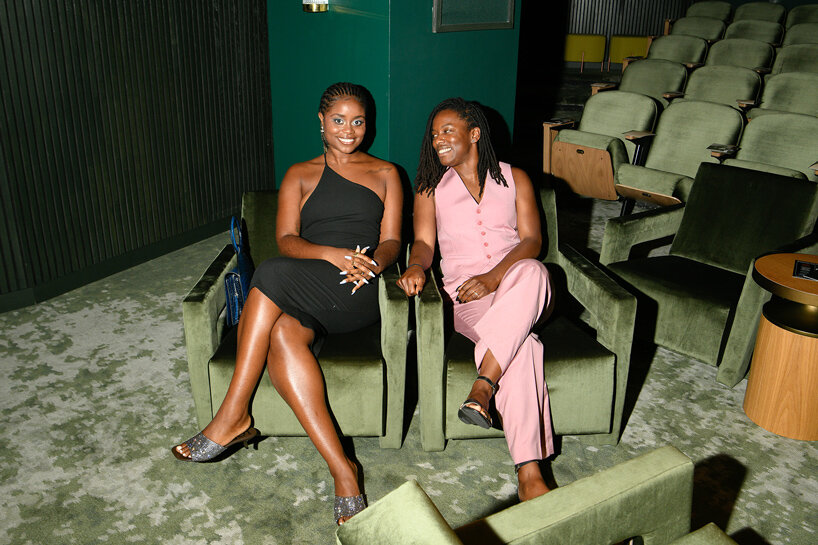
director Shatara Michelle Ford (right) shared their goal of addressing societal issues and systemic challenges. image © Deonté Lee / BFA
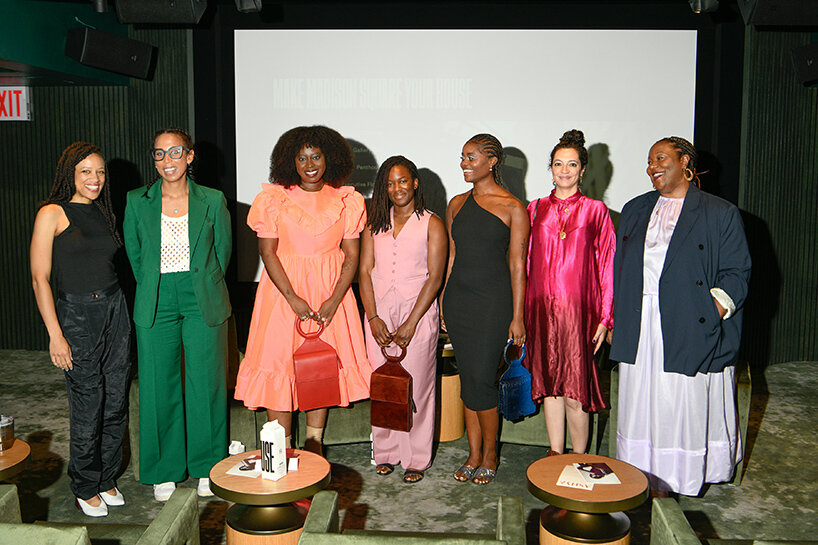
BlackStar Projects founder Maori Karmael Holmes (right) is pushing the industry toward inclusivity. image © Deonté Lee / BFA
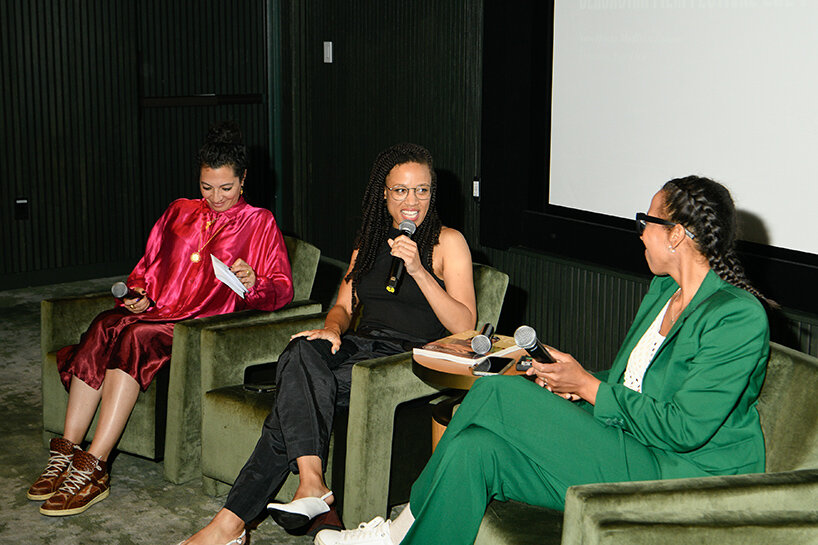
filmmaker Madeleine Hunt-Ehrlich (right) previews The Ballad of Suzanne Césaire. image © Deonté Lee / BFA
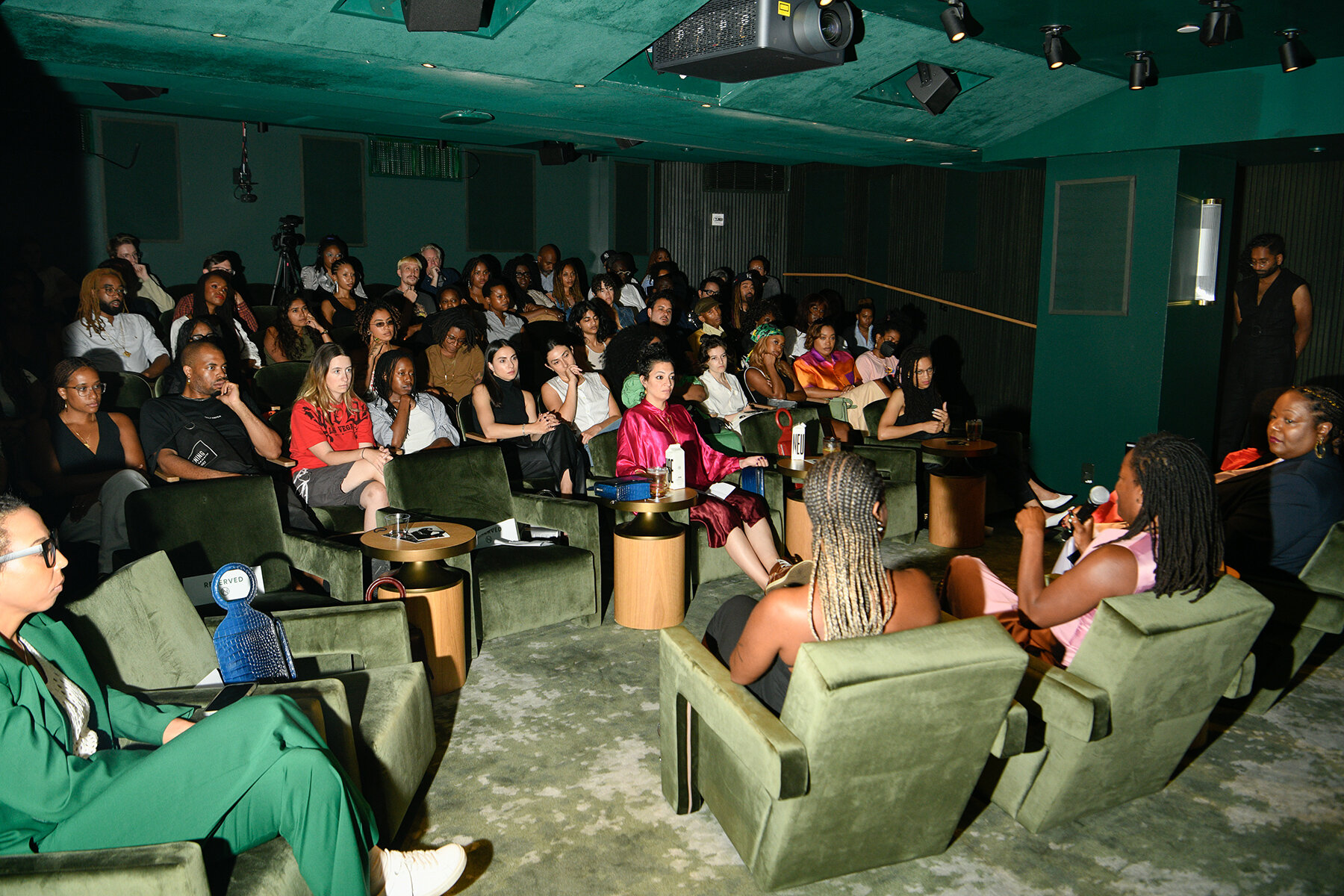
celebrating its 13th year, BSFF continues to spotlight work from Black, Brown, and Indigenous filmmakers. image © Deonté Lee / BFA
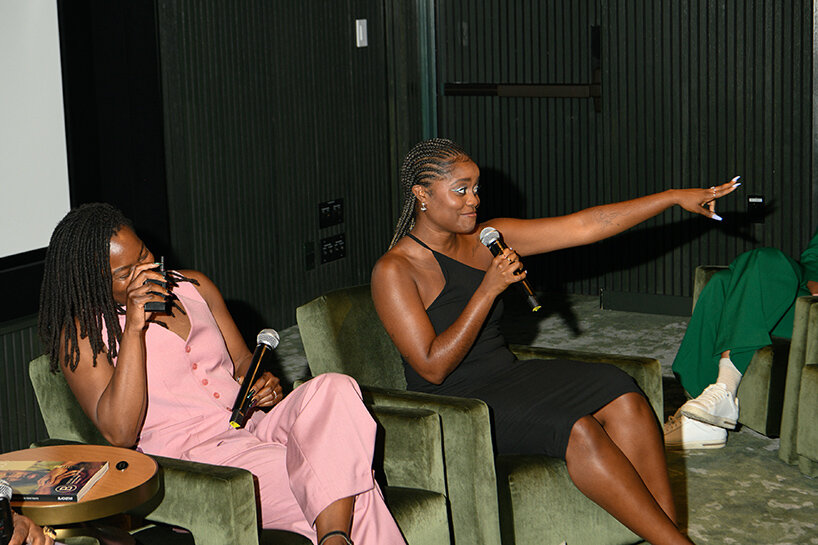
the team highlights their creative processes and the importance of authentic storytelling. image © Deonté Lee / BFA
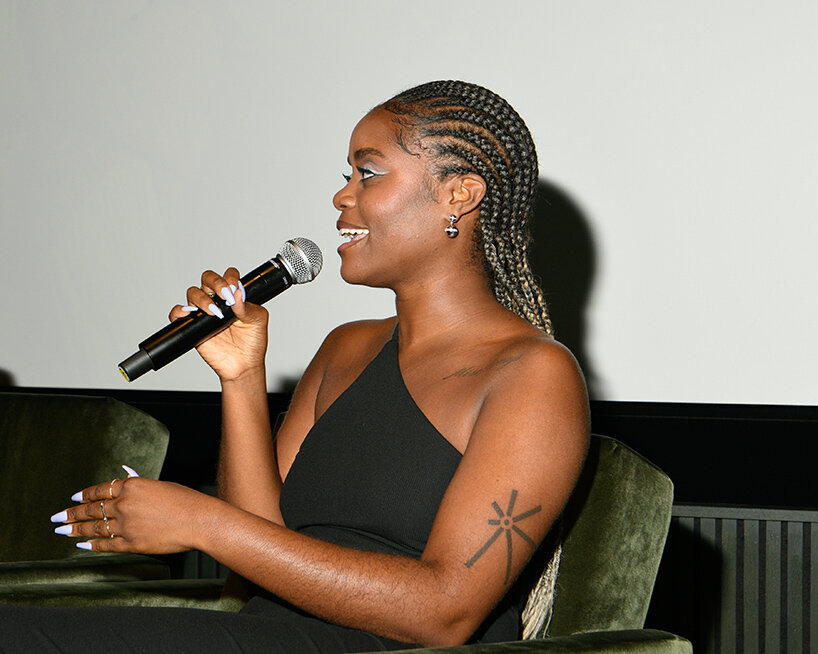
actress Denée Benton discussed the lack of representation in the mainstream film industry. image © Deonté Lee / BFA
project info:
project title: Neuehouse Cinema
event: Blackstar Film Festival | @blackstarfest
interior design: Rockwell Group | @RockwellGroup
location: Neuehouse, 110 E 25th St, New York, NY
festival dates: August 1st — 4th, 2024
photography: © Deonté Lee / BFA, Jason Varney for Rockwell Group
architecture in new york (604)
art interviews (161)
cinemas (31)
david rockwell (30)
PRODUCT LIBRARY
a diverse digital database that acts as a valuable guide in gaining insight and information about a product directly from the manufacturer, and serves as a rich reference point in developing a project or scheme.
